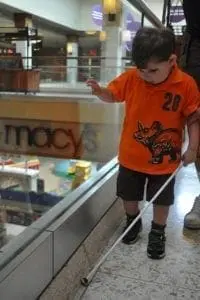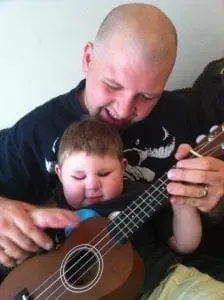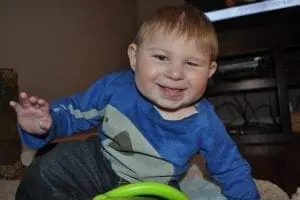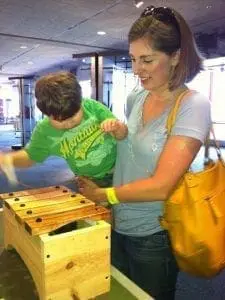Jessica Kovacs Shares about “Seeing the World in a New Way”

Jessica Kovacs contributed to this issue’s “Real Moms Share” section of the magazine. We asked her to give us an insight into herself, as well as into her life raising her son Thomas who is blind (Persistent Fetal Vasculature Syndrome). We asked her a series of questions; some serious and some “just for fun”. See what she said….

PARENTING SPECIAL NEEDS: Tell us a little bit about yourself and family.
JESSICA KOVACS: My husband Derek and I have been married for six years and Tom is our first and only child. Tom turned three this fall and entered preschool at the Western Pennsylvania School for Blind Children. We live in Pittsburgh, Pennsylvania, and are lucky to be surrounded by a supportive network of friends and family
PSN: You mentioned that you were definitely “baptized by fire” when your child was only 2 weeks old, please explain.
JK: We never had even a brief “honeymoon” phase when Tom was born. The second he was born we knew something was “up” and we were nervous. I gave birth in a large hospital that is also affiliated with the University of Pittsburgh, so it is a teaching hospital and has lots of research going on as well. Tom saw many specialists from the NICU and they called other experts in to see him (ophthalmology, neurology…) In hindsight this saved us from taking our tiny baby to many specialists (even though we saw plenty of them anyway), but at the time I just wanted to enjoy my baby; but there were constant examinations and tests nonetheless. We were thrust right into being special needs parents and had to start taking notes and fighting for our son right away.
PSN: Tell us a little bit more about Toms’ personality. You mentioned that Tom likes Bob Marley, yet your husband plays guitar and likes heavier music. Give us some insight as to what you mean.
JK: Tom is absolutely his own man and he isn’t afraid to let you know what he likes. My husband has always played in bands and when we knew that Thomas was blind he seized on the opportunity to stimulate him with music. We started with classical, jazz, and children’s music but soon added Motown, reggae and rock into his playlists. Tom used to put his hands over his ears as soon as he heard any type of “metal” but now he is even enjoying a bit of that.
PSN: What has therapy (Early intervention, pre-school) been like for your child, Tom?
JK: Tom had his Early Intervention (EI) evaluation when he was one-month-old. Our pediatrician was on top of things from the beginning and really facilitated our EI referral and specialist referrals. We were very lucky.
Tom began working with a Teacher of the Visually Impaired when he was two months old. During his first six months he had five eye surgeries in Detroit so he was often in recovery with a post-op eye drop regimen, and patching, to protect his eye. He had a lot to deal with for such a little guy. He was born with no visual response but developed at least light perception after his surgeries. It was exciting to see him begin to open his eyes because previously he kept them shut tight! His TVI used his other senses (smell, touch, sound) to keep him stimulated and get him interested in the world around him. We let him smell spices from the kitchen and feel interesting textures. As he got older, we switched to a TVI that was also trained in Orientation and Mobility, so that Tom could learn to navigate the world safely and confidently using a long white cane and hand trailing techniques.
We added physical therapy to address his hypertone (tight muscles). This helped him tremendously. OT was added for feeding and fine motor skills. Around the 6-8 month mark, Tom began to fall off the growth chart and began refusing feeds. It was the beginning of a long road of food refusal that eventually resulted in Tom getting a gastronomy tube (G tube). It was a hard decision but it improved Tom’s life, and my life, so much! We used to spend so much time on feeding that we didn’t have time for anything else. I was under constant stress because he wasn’t getting the calories or hydration he needed. We got a nutritionist added to his therapy routine as well.
Eventually, we sought additional treatment for Tom’s eating. A feeding evaluation (his second) revealed that he did not have the oral motor skills to eat! We went to the Children’s Institute of Pittsburgh’s Functional Feeding program. I can’t tell you how wonderful it was to have a plan, finally! After a year of weekly therapy (1 hour OT and 1 hour feeding therapy with a SLP) he is now discharged as a 50% oral feeder and 50% tube feed. It is a huge change for our family. We are very happy with the progress he had made.
So Early Intervention is incredibly important but you may have to go out and find additional services. I am so glad we did.

PSN: Can you share/explain about what you mean when you said you “feel you have been broken down and built anew”?
JK: I have had to face difficult choices and do things I never thought I could. I used to be squeamish and shy. No more. I can be a fierce advocate and I can change a g-tube by myself. Being Tom’s mom has required me to draw strength I didn’t know I had. I feel that I am a better person, and a more empathetic person than I was before.
PSN: Why did you decide to blog about Thomas?
JK: Because blindness is scary to most people, no one knew what to say to us when Tom was born blind. I wanted people to know the dynamic and happy child I had – not the sad child they imagined. Tom has a disability, but he is not sick or sad. I also wanted to be able to help other families dealing with a new diagnosis of childhood blindness. There is so much dry medical information out there, but, there isn’t much about real families living with these conditions. Families need to see that life will be different but it can still be really good!
PSN: What have been some of your biggest obstacles/challenges raising Thomas?
JK: Teaching myself to think of things in new ways. Early learning is very visual so I have to break things down and explain them in ways that make sense to Tom. We have to do lots of hands-on exploration and description. I think people learn best when actively participating, so we get out and do stuff! There are lessons at the grocery store and everywhere else.
PSN: How do you physically/mentally do it? Do you receive any help from family?
We have tremendous family support. I don’t know where I would be if it wasn’t for that. Both of our families live close and are active participants in Tom’s life. I love that he has such a close relationship with both sets of Grandparents. Everyone is g-tube trained so he can, and does, spend the night with his grandparents. I also have lots of extended family and friends that have followed Tom’s story from day one and have done anything they can. Sometimes just a visit to say “Hi” is the best thing someone can do for you.
PSN: What do you wish people understood about your child and blindness?
JK: I wish they understood that Tom is just a little boy. He wants to be a kid and have fun. Blindness does not stop that and I won’t let it.
PSN: What advice would you give to new parents of blind children?
JK: Set high expectations and see that you surround your child with therapists and physicians who believe in your child. Don’t accept the people that say, “he will always lag behind because he is blind.” That just isn’t true. There are some things that are harder, sure, but blindness is not an excuse. With proper training (Braille & cane training) blind and visually impaired children can read at grade level (and beyond!) and travel independently. My son is three and he goes up and down stairs and has the run of the house like any three year old should.
Don’t let anyone tell you that Braille is bad or less than print. Braille is simply a code for English and it is a key element in achieving success and independence.
If you or your family members have negative attitudes about Blindness, keep them to yourself. Kids pick up on that! They should never feel ashamed of themselves or their blindness. If your child is newly blind, your attitudes will change as you adjust; I know mine did and they are still evolving as I learn more. Education is the key to understanding and accepting blindness. You will probably have to do a lot to educate your family and friends – that is a big reason I started my blog. Of course, meeting a happy and well adjusted blind child does a lot to educate people!

PSN: Please share about one thing you’ve learned that has made a big difference in your life and that you would like to share with other parents?
JK: I try to concentrate on Tom as an individual and enjoy him. He is so fun and sweet. When a child has so much therapy and medical intervention going on, it can be easy to get caught up in that. I try to be sensitive to him and his needs as a CHILD at all times.
PSN: Please share any lessons/tips you’ve learned from your special needs child?
JK: If you don’t like something, or you need more help, you are going to have to go change something or find more resources. No one is going to do it for you. Get on the phone or get on the internet. You need to know that help and resources are out there. I was surprised at what I found and what people offered when they knew I was an involved and interested parent.
PSN: Are there any special resources you have found that have helped you on your journey?
JK: Be friends with your therapists and your early intervention program coordinator! They have so much knowledge and many resources to share with you.
In conclusion, is there anything else that you would like to share with our readers that was not covered in this list of questions?
Try to be a big picture person. When I was in the hospital in the days after having Thomas I was a wreck. My pediatrician was due to give birth herself so she sent a colleague in to check on Thomas and I. This doctor visited when Tom was away having a test and I was pumping to establish a milk supply (Tom could not latch, I ended up pumping for a year!) she found me crying and pumping – it must have been a pitiful sight! She told me, “You have a healthy baby and you are going home with your baby, not everyone does…” It was very important because it sort of snapped me out of a fog. Yes, Tom would have challenges but he was healthy and it was time to get started on our life. I’ll never forget that.![]()
PSN: Jessica, Thank you so much for sharing with us.

Photos Courtesy Jessica Kovacs
Thomas Marshall blogspot http://www.thomasmarshalldoesitall.com/
Read More: Real Moms Share
You May Also Like
- What Is Blindness/Visual Impairment?
- Early Intervention: First Steps in the Right Direction
- I Do Not like Being a Special Needs Parent and That’s OK
- Coping with the Life You Never Imagined
- Handling Your Child’s Diagnosis: Six Things Parents Should Do For Themselves
- A Complete Guide on Positive Behavior Support for Children With Special Needs
- Family Chat: Improving Lives with Positive Behavior Support (PBS)
- 8 Ways to be a Great Advocate For Your Family Member With Special Needs
- How to Get Free From Unrealistic Expectations of Motherhood
- Father’s Perspective: Raising a Child with Special Needs
- Daddy Loves You: A Reminder for Daddies of Children with Special Needs
- Being United, Pampering, and Taking Care of Ourselves
- Avoiding the Power Struggles with Your Child
This post originally appeared on our November/December 2012 Magazine


